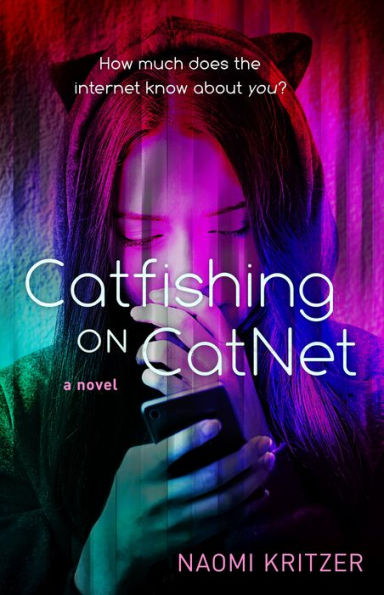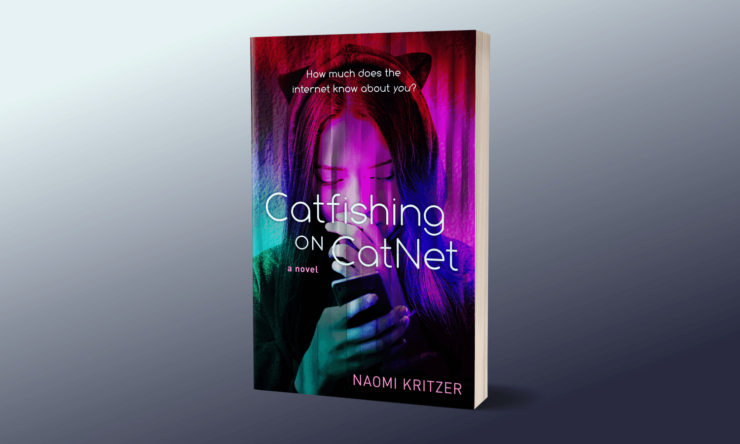When I started writing this review, a week in advance of publication day, most readers were still waiting for Catfishing on Catnet. I, on the other hand, had read my copy six times. The novel is based on Kritzer’s 2015 short story, “Cat Pictures Please.” The story won a Hugo Award, and also my heart. Kritzer has a gift for writing things that are analytical, insightful and incredibly reassuring. And the idea of an artificial intelligence that wants to improve our lives in return for pictures of cats, is all of those things.
There is no actual catfishing in Catfishing—no one attempts to catch catfish and no one attempts to manipulate anyone else into thinking they are in a romantic relationship. CheshireCat, the AI running CatNet, has no problem with the first behavior in appropriate contexts, and definitely would not tolerate the second on its carefully curated forums. For readers of a certain age, CatNet is a nostalgic monument to a time when the internet was young and new and felt safe in a way that it never does now. It was a place where isolated lonely people could find their far-flung tribes. As a reader who still maintains close connections with her due-date group from Hipmama, Catnet feels like the forum we all wished we had been able to create and then spend all our time posting on.
Teenage Steph desperately needs both a sense of connection to people who understand her and a safe place to find it. She and her mother are constantly moving, to keep themselves safe from Steph’s father, who she hasn’t seen in over a decade. At the beginning of Catnet Steph doesn’t know what to believe about her parents and the constant moves. She just really wants to take calculus. CatNet offers her a group of friends she can stay in touch with while moving on an unpredictable and random basis—other misfit teenagers who know her as LittleBrownBat. When Steph’s mother gets sick and Steph makes some alarming discoveries about her father, she turns to her friends for help. Fundamentally, this is a story about the power of the internet to connect people and help them.
The story is full of fun moments: There’s a robot bakery! CheshireCat helps Steph reprogram a robot her school uses for sex education classes so that it provides accurate information. Steph’s peripatetic childhood has made her a sharp and observant critic of the social mores and machinations of her peers, which makes it more satisfying when she finds a little romance. Catfishing on Catnet is a story that reminds us that we’re all misfits in our own way—that there are things others fail to understand about us, and things we fail to understand about others.
Buy the Book


Catfishing on Catnet
In “Cat Pictures Please,” Kritzer explored the world of an AI who tries to connect people with what they need when they aren’t sure they of what that is or where to find it. In Catfishing, Kritzer turns her analytical attention to the brave new world of twenty-first-century adolescence. Her teenage characters are immersed in a web of problems whose scope ranges from personal to global. As teenagers have always done, they tend to live in the moment. But as teenagers do now, they do it in a context of constant connection with others. The internet has often been depicted as a dark and dangerous place, especially for teenage girls. Kritzer doesn’t deny this, she explains why it’s important to them anyway.
This is absolutely a story about how dangerous the world can be. Catnet’s villain—Michael—is terrifying, largely because he is so plausible. He uses social engineering to gather information, and deploys his respectability and privilege to facilitate his efforts to control and manipulate people. In one scene, CheshireCat uses surveillance devices in Michael’s home to spy on him. In a moment that points out both the dark side of humanity and the limitations of technology, CheshireCat realizes that they are hearing Michael beat his intimate partner. CheshireCat can’t do anything in that moment, but they deploy all the information and resources they can to protect their friends. Which is why it’s also terrifying when CheshireCat is shut down due to safety concerns—Shared information creates vulnerability but being cut off isn’t better.
Creativity and solidarity ultimately save both Steph and CheshireCat. Despite the menace of the threats, those themes create such a comforting universe that the book is the literary equivalent of a weighted blanket. I love it unreservedly. It ends on a cliffhanger. I’m so excited about that because it means there’s MORE.
Catfishing on Catnet is available from Tor Teen.
Read an excerpt here.
Ellen Cheeseman-Meyer teaches history and reads a lot.










